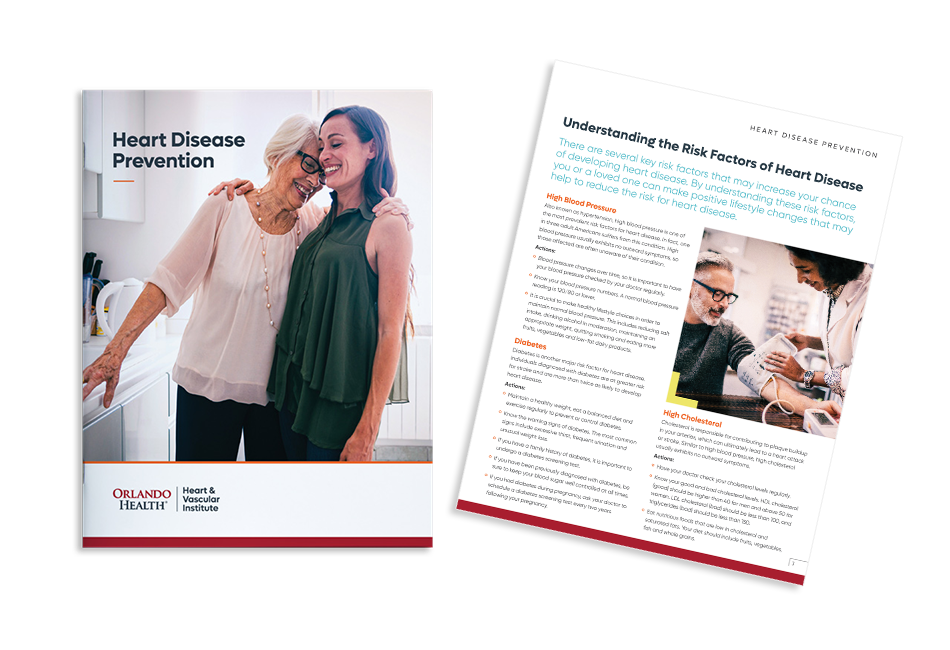A heart disease diagnosis can be scary, but at Orlando Health Heart and Vascular Institute, you will find the expertise and support to face it with more confidence.
We bring together a team of highly trained cardiologists, surgeons, clinical nurse specialists, physical and occupational therapists, dietitians and social workers to address all aspects of your health and well-being.
With a range of diagnostic services and treatment options — including both surgical and nonsurgical approaches, as well as clinical trials for promising new therapies — we will work with you to develop a personalized care plan as unique as your heart. Our commitment to compassionate, comprehensive care informs every part of your specialized care.
People often think of coronary artery disease (CAD) when they hear the term heart disease, which results from fatty deposits narrowing your body’s arteries. While CAD is the most common form of heart disease, there are other forms, too, including heart valve problems, congenital heart defects, abnormal heart rhythms, heart infections and heart failure.
Many of these conditions are caused by atherosclerosis, which is the buildup of plaque along the walls of your arteries. That buildup causes your arteries to narrow, making it more difficult for your heart to push blood to other parts of your body. If plaque continues to accumulate, it can lead to chest pains, clots, stroke and heart attack.
Over time, atherosclerosis can also lead to the development of coronary artery disease, irregular heartbeat or even heart failure. Treating any of these conditions requires lifestyle changes and medical care, but many people enjoy full, active lives when their condition is managed properly.
Symptoms often vary, since heart disease encompasses such a wide range of conditions, but
some common signs of heart disease can include:
- Shortness of breath
- Dizziness or lightheadedness
- Chest pain
- A slow or racing heartbeat
- Pounding or fluttering heartbeats
- Pain, weakness or numbness in the arms or legs
- Fainting or nearly fainting
- Swelling in the hands, legs, ankles or feet
- Fatigue
Nearly half of all Americans have at least one of the top three risk factors, according to estimates. Some are outside of your control, but others can be modified by lifestyle changes.
Risk factors include:
- High blood pressure
- Also known as hypertension, high blood pressure is one of the most prevalent risk factors, with one in three Americans suffering from the condition.
- High cholesterol
- Cholesterol contributes to plaque buildup in your arteries, which can ultimately lead to heart attack or stroke.
- Smoking
- The chemicals in tobacco smoke can damage the cells that line coronary arteries and other blood vessels, contributing to atherosclerosis.
- Diabetes
- If you have diabetes, you are at greater risk for stroke and are more than twice as likely to develop heart disease.
- Physical inactivity
- Regular physical activity improves your cardiovascular health while reducing the risk of heart disease and stroke. Exercise can also help control other risk factors.
- Alcohol use
- Excessive alcohol intake can raise the level of triglycerides in your blood and increase blood pressure, which may increase your chance of developing heart disease.
- Stress
- If left unmanaged, stress can lead to emotional, psychological and even physical problems, including heart disease.
- Sleep apnea
- An inability to breathe properly at night may result in low blood oxygen levels, which can weaken your heart over time.
- Age
- Heart disease can happen at any age, your risk increases as you get older.
- Genetics
- Family history can play a major role.
Our fellowship-trained cardiologists and surgeons are experts in the latest options available for managing and treating heart disease. Our team will work with you to find the right treatment plan – whether that’s surgical or nonsurgical – for your unique needs. Some options include:
- Cardiac monitoring
- Routine imaging is critical to ensure your heart is working as it should be. Your ongoing evaluation will include echocardiograms to monitor your heart’s structures and blood flow and electrocardiograms (EKGs) to watch your heart’s electrical activity.
- Medication
- Medications can lower your blood pressure and cholesterol. They can also help with heart failure or abnormal heart rhythms.
- Cardiac catheterization
- This procedure uses a thin, flexible tube (catheter) to reach the heart by way of a blood vessel. During the procedure, your surgeon can diagnose and treat some heart conditions, including clogged arteries and irregular heartbeats.
- Open-heart surgery
- Open-heart surgeries require a long incision down the center of your chest to open the breastbone and access your heart. The surgery can be used to perform coronary artery bypass graft (CABG) surgery, which opens a new route for blood to flow around a blocked artery.
- Clinical trials
- Clinical trials are studies that help us discover and develop new diagnostic tools, therapies and treatments for heart disease. The ultimate goal is to improve the lives of our patients. Trials involve collaboration across multiple departments, with researchers involved in design, testing and analysis of these studies. Trials also offer our patients a way to gain early access to promising treatments.
Download Our Free Heart Disease Prevention Guide

Learn about all of the symptoms, risk factors and treatment options in our free all-in-one Heart Disease Prevention Guide. Download yours today.
Trusted. Nationally Recognized.
Request an Appointment
If you have been diagnosed with heart disease, our specialized team is ready to evaluate you and develop a treatment plan that is right for you.




